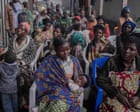
In an interconnected world, the allocation and management of aid resources have profound effects on vulnerable populations. Recent developments underscore the critical decisions faced by policymakers and humanitarian organizations seeking to alleviate suffering and foster stability.
The UK’s decision to reduce its aid budget from 0.5% to 0.3% of national income has spurred significant concern. An impact assessment by the Foreign, Commonwealth & Development Office projects notable repercussions for several African countries. These cuts, justified as a means to redirect funds towards defense spending, may hinder educational endeavors and escalate the risks of disease and mortality in regions already grappling with significant challenges. While the intention is to balance budgetary priorities, the potential implications on humanitarian initiatives highlight the delicate balance governments must maintain between domestic and foreign policy obligations.
The situation in Gaza presents a poignant illustration of the dire human consequences when aid access is constrained. The World Health Organization has raised alarms about the mass starvation gripping the region, pinning the blame on man-made factors such as the blockade that restricts essential supplies from reaching those in desperate need. Tedros Adhanom Ghebreyesus, the WHO’s Director-General, emphasized the gravity of this crisis, describing it as an acute humanitarian emergency. Over 100 aid groups are advocating for an easing of these restrictions, underscoring the necessity for immediate action to prevent further loss of life and preserve human dignity.
The human stories emerging from Gaza are heart-wrenching. Hospital wards are filled with malnourished children like seven-month-old Mohammed, whose skeletal frame tells of the severe deprivation he endures. For many families, the scarcity of resources has transformed basic needs into insurmountable obstacles. The children, who represent the future of the region, are at the forefront of this struggle, their plight underscoring the urgent need for coordinated international efforts to ease the blockade and facilitate the inflow of vital aid.
These developments call for a renewed discussion on the ethics and efficacy of aid distribution. While resources are finite, the human cost of austerity measures and geopolitical strategies can extend far beyond immediate fiscal calculations. Effective resolution requires collaborative initiatives and sustained commitment from the global community to ensure that foundational human rights are respected and safeguarded.
Addressing these issues involves delicate diplomacy and a willingness to transcend political complexities for the sake of shared humanity. As global citizens, fostering empathy and understanding, and advocating for comprehensive solutions are essential steps towards building a future where aid serves as a bridge, not a barrier, to peace and prosperity. Recognizing and acting upon our interconnectedness can transform challenges into opportunities for fostering resilience and hope across the globe.
Source: {link}
